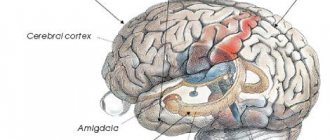Researchers from the University of Bristol studied the reaction of rats to tickling. They found a way to accurately measure the emotions of rodents and noticed that some of them squeaked during this procedure. Tests have shown that the pitch of the squeak is directly proportional to the level of pleasure the rat experiences when tickled. This once again proves that tickling is an ancient mechanism inherited by humans from distant ancestors.
Our body constantly “talks” to us in the language of signals. We'll tell you why evolution came up with some physiological mechanisms and what meaning it put into them.
Tickling
There are different versions of why nature has endowed us with the ability to laugh when tickled, as well as to be afraid of it. One hypothesis is that it signaled to our ancestors about insects crawling on the skin that could be parasites. Hence the fear of tickling, familiar to many of us.
But then it is not clear why tickling causes laughter. Is this a normal reaction to insects crawling on your body? Therefore, other scientists adhere to a different version: tickling is needed to establish contact between the cub and its mother. With its help, without having absolutely anything at hand (or paw), they can play, have fun and get positive emotions. This version is also supported by the fact that with age we stop responding to tickling with laughter. On the contrary, many people find it unpleasant.
It's ticklish! What makes you laugh? More details
There is an opinion that in previous centuries tickling was used as torture and could bring a person to death. “Most likely, these are fictions and horror stories,” says physiologist, candidate of medical sciences Nikolai Zakharov . “You can’t tickle a person to death.” The body adapts to the tickling: you either stop feeling it or temporarily lose consciousness.”
“Tickling is an art. Not everyone has it." 5 stories of fetishists
Tickling - getting pleasure from tickling
Tickler - someone who likes to tickle
Tiklya - the one who is tickled
Switch - universal
Alexey, 40 years old, Moscow:
The need to tickle someone began in kindergarten. I remember holding the girl’s leg, and she laughed and said: “Well, hva-a-atit!” For a long time I felt lonely: I only met the first girl who enjoyed the process when I was 25 years old.
I am from that generation for whom tikling seemed abnormal. It’s not that there was no special forum, there was no Internet at all. The first Russian resource on this topic appeared in 2001. The foundations of the tikling movement in Russia were laid by two people: Lekha-tikler (also called Boss) and me. He was the first. And the first Moscow thematic video was with him. Then we also started filming, with our members of the forum. The procedure is simple. You find a model, find a place, choose a ticker - and off you go! You can think through scenarios, but people don’t need it: everyone understands that this is fiction, the acting is very mediocre. But the naturalness of the reactions is good. I always tested the girls first: I met them, examined their paws and tried ticking. With a girl who doesn't want to be stroked affectionately, tikling can only happen once.
Tikling is present in my life in waves: sometimes it dominates, sometimes it’s in the back of my mind. I can live without it, but I wouldn’t want to. My other half does not accept tikling, so I have to lead a double life. I do everything so that these aspects of life do not intersect. And so it is for many people. But some were more fortunate: they managed to introduce forum members into their closest circle of friends and family.
I prefer foot tickling, but I can’t call myself a foot fetishist. The combination of tikling with sex is possible, but this is a different level of relationship. There is no sex within the tikling mainstream, but if the girl wants, if there is mutual sympathy, I can help with my hands. It's very fun to combine the two processes. It’s sad that lately everything has been somehow emasculated: beginners immediately invite the girl from the topic to take up tikling, and then they are very surprised when they are sent. People’s reasoning goes like this: “Well, you like tickling, don’t you? And I love. So let's go." This approach is typical for boys. Immediately suggesting tikling is indecent and rude. It's like asking a girl you just met for sex.
Igor, 32 years old, Ufa:
Tickling is an art. Not everyone has it. I call tickling a caress on the verge of feelings: you stroke it, it doesn’t tickle, you press it a little differently, a little harder, and it tickles, but if it’s too hard, it hurts.
I have liked tickling since childhood. I'm shy, I was afraid to pester girls. But the incident with a distant relative stuck with me for the rest of my life. We were probably 10 years old. We were fooling around and lying on the sofa. I don’t remember why exactly, but she said: “But I’m not afraid of tickles!” I froze at first, then I realized that this was exactly what I needed. I don’t believe it, I say, and she: “Everyone is afraid, but I’m not!” I suggested she check it out. She lay down on her back, raised her arms, and with a sinking heart, I began to quietly tickle her sides. She lies calmly, I tickle her armpits - and still calm. He began to move his fingers harder and faster, saw a smile on her face and began to tickle her stomach more boldly. She couldn't stand it, turned over and covered herself with her hands. My hesitation went away and I straddled her and put my hands under her. There was a lot of squealing and laughter. I don’t know how long I tickled, but the adults stopped us and told us not to make any noise.
As an adult, I found a thematic site on the Internet and realized that I was not the only one. I've been in this topic for more than 10 years. I only tickle girls. I meet them on the Internet. Girls' tummy is usually very tender and sensitive. It’s a special thrill if a girl is afraid of tickling in the navel area. I use my fingers, feathers, brushes, combs - the more ticklish I am, the more I tickle. Sometimes I tie up girls, but it’s more like an addition. The session does not necessarily end with sex; it is also very good without it.
Tikling occupies a big place in my life: this pleasure is no less important than sex. I dream of finding a girl who would love tickling as much as I do. But for now I’m hiding my fetish: my friends don’t know, my relatives don’t know either, only the girls I met on thematic sites know.
Natalya, 37 years old, Saratov:
In high school I did martial arts. The group included children aged 10–11 years. If someone your age hits you, you can hit him back, but you can’t hit him back with a child, so we caught them and tickled them. At that age, I myself was also wildly afraid of tickling. My mother drove me out of the chair when we shared it. Now I’m practically insensitive to her, but I like to tickle others.
In 2004–2005, I came across a thematic forum. It was interesting for me to communicate with like-minded people. There are a lot of foot fetishists on the forums, but somehow feet don’t bother me; I’m more interested in the general reaction of the body to tickling. Once I agreed on a forum to meet a man. We met in Moscow. After another six months, I saved up some money and came again. I did several trial sessions. Very quickly I found out that a person who is afraid of tickling not only dodges, he also unconsciously fights off. When a man does this, he becomes a big deal, so bondage is a must.
Ticklers are divided into soft and extreme. I am an extreme tickler who will not stop simply because he was told: “Stop!” No need!" I decide for myself whether it is necessary or not.
I prefer it when a man is stripped down to his underpants so that different parts of the body are accessible. It is clear that adults almost always have an erotic component, but in my sessions there is no sex. I warn you about this in advance. And I also try not to take tickles over 45 years old. Tickling is always a strain on the heart. I won’t take a person for a session who has heart problems; I don’t want to think during the process whether it’s a heart attack or not. There is a risk that a person may suffocate, but these are extremes and should not be taken to them.
In my profile on the thematic website there is a note “I don’t need financial support, but I won’t refuse.” But I don’t really need money. If I go to a session, the meeting place is the host's problem. No “let’s chip in” options. Sometimes people give me devices that can be used for tickling. But this note is intended to scare away inadequate freeloaders who think that I almost have to pay them.
The man I've been with for many years knows that I'm into tikling. He doesn't like tickling, so we don't do anything like that with him. Tikling is a rather rare entertainment for me. Sessions happen a maximum of 2-3 times a year, most often on location. Tickling is not a major part of my life. For me, this is just a hobby, like sports, for example, but I was more interested in sports. I don’t even know what to compare it with. Well, it's like watching a TV series.
Ruslan, 29 years old, Khabarovsk:
I am very afraid of tickling and love it very much - it is an unbearable pleasure. I prefer to be tickled by girls, but not against guys. I’ve been involved in the topic since college: I found groups dedicated to tikling on social networks, began to study comments, watch videos and fell in love with this business. Here in Khabarovsk, unlike Moscow and St. Petersburg, this topic is practically not developed. That year I met a tickler and went to her for a session in Moscow. I was tied up and tickled with various devices. At first we filmed it for about an hour. After filming, the tickler tormented me for another 2 hours. It was indescribable: I was squirming like I was in a frying pan. I also did some virtual tickling. It was funny. When real life is impossible, virtual sometimes saves you. But in general, I'm looking for a switch girl who is afraid of tickling and is ready to tickle herself.
I corresponded with one American woman from the topic. She said that she works in an agency where clients are tickled. And this is not uncommon there. Once upon a time, Moscow massage parlors also provided tacking services - a tickling session for nervousness. Now for some reason it’s no longer there, which is a pity.
I don't particularly advertise my hobby. I can tell the girls, but my guy friends don’t know about it. Girls like that I'm ticklish. They love to take advantage of this: for example, I don’t want to tell something, but they tell me that they will tickle me until I tell it. If I'm tickled, I'll confess to absolutely everything, even things I've never done. It’s impossible to touch me - I immediately jump, I’m very sensitive. Tickling is fun and, most importantly, not painful. Try it yourself. Many were indifferent, but then they tried it and got involved.
Alexey, 36 years old, Moscow:
I developed an interest in feet when I was three years old. I loved playing with my mother's feet back then. At the age of fifteen I realized that I liked not only to caress my feet, but also to tickle them a little. When I was about twenty, I periodically came to visit my neighbor in the stairwell. We communicated well. One evening I stayed with her, and she got ready to sleep and went to bed. I sat next to her and asked if I could lick her toes. She grinned: “What, have you gone crazy?” Then I explained everything to her, and she agreed. This was my first fetish experience.
The girls I dated were okay with my fetish. Once a girl invited me to her home on the first date. She didn't look like a whore, she was a decent girl. I didn’t tell her anything, I just started caressing her legs. She didn't mind. It all ended with sex. Another girl I met on a regular dating site, as it turned out, had dated a foot fetishist before me. Sometimes I go to meetings with forum members - ticklers and foot fetishists. We're just communicating. Sometimes there are themed meetings in rented apartments.
Because of my interest in feet, I went to work as a sales assistant in a shoe store. But there was nothing like that there. I also worked in a store as a database operator, and there I practiced foot fetishism in a mild form, stroking the feet of my female colleagues, for example. And in general I talked with my employees about this topic.
About six months ago I started thinking about my fetish. This was the only time I got so seriously tense and even wrote on the forum that I didn’t want to be a pervert. It was some kind of rethinking of my life after contemplating myself, my essence. But now time has passed, I have relaxed, and my fetish does not bother me. My sexual interest sets me apart from the crowd of standard people, but I never felt lonely.
The film Tickled can be seen on May 26 at the Beat Film Festival at the Karo Oktyabr cinema.
Goosebumps
They cover us from the cold. But it happens that their appearance is caused by some event colored by strong emotions - someone’s action, a movie seen, music listened to...
This mechanism, which in the language of science is called piloerection, and in common parlance - “goose bumps”, also came to us from primitive people, and to them from their mammalian ancestors. Goose bumps on the surface of the body are caused by the contraction of tiny muscles in the skin. They raise the hair when freezing so that the heated air lingers longer near the body and does not fly away into the surrounding space.
"Goose pimples". Why do goosebumps appear and run all over your body? Read more
The same reflex is triggered in a situation of danger: raised hair makes the animal (look at a cat when it meets a dog) more massive, giving it a frightening appearance. With strong emotional reactions - rage, fear, delight - our nervous system is excited, and this can lead to goosebumps. If we had wool, it would stand on end at that moment.
Piloerection has lost its practical meaning for humans, turning into a rudiment, like some organs of our body - the coccyx, the appendix. After all, Homo sapiens long ago lost their thick coat of fur, and invented clothing to protect them from the cold.
Shiver
This mechanism is similar to the one that causes goosebumps. When a person is cold or scared, he begins to tremble. Why?
Warm-blooded animals, and we are one of them, have a very important physiological ability - to maintain body temperature at a constant level. Trembling your muscles is one way to avoid heat loss and a drop in temperature when it suddenly gets cold. Skeletal muscles begin to make small and frequent contractions, which release heat that spreads throughout the body.
“The brain runs on one battery.” What our scientists found in the human head Read more
“When a person is scared, he also begins to tremble. This way we strengthen the functioning of the nervous system, including the autonomic one. All organs and internal systems are tuned to actions related to salvation - either an attack on the enemy, or a swift escape,” explains the scientific secretary of the Institute of Physiology. I. P. Pavlova RAS, candidate of biological sciences Alexander Chuikin .
It is noteworthy that muscle contractions are sometimes used by cold-blooded animals: insects, fish, and reptiles. For example, bees and bumblebees warm their hives and nests due to the intensive work of their wings. They do this to prevent the developing larvae from getting cold.
Kinesthetic learners who are afraid of tickling are potential jealous people
However, let us return to the relationship between the fear of tickling and feelings such as jealousy. Psychologists believe that, depending on the way they perceive the world around them, all people are divided into three types:
- visuals;
- auditory learners;
- kinesthetics.
The first perceive the world primarily through their eyes, visually. The second - with the ears, auditorily. Still others are tactile. Kinesthetic people love the comfort around them and find it difficult to withstand any stress or discomfort. The algorithm for the emergence of jealousy is as follows: a person sees his “soul mate” and immediately imagines a husband or wife hugging their lover or mistress. It's good if it's just a fantasy. But if the suspicions are justified, negative kinesthetics intensify a hundredfold. The mechanism of tickling is very similar: tangible, and most importantly, sudden irritation from the outside, avoidance of this process by those who are tickled.
That is why we can draw a reasoned conclusion: the sign about the connection between the fear of tickling and jealousy is true only when a person kinesthetic in the way he perceives the world around him .
Cry
The practical benefits of tears are well known to physiologists and ophthalmologists. They moisten the cornea of our eye and thereby protect it from foreign objects (for example, from an eyelash falling into the eye), as well as from drying out, infections, and caustic volatile substances. And thus improve the quality of vision. For example, if a speck or eyelash gets into the eye, the tears will wash it away.
Cry, girl! What are the benefits of tear therapy? More details
All land animals have lacrimal glands, which constantly produce a fluid of complex composition. By the way, the chemical compositions of blood and tear fluid are close. Roughly speaking, it is a derivative of blood and also contains several types of salts. And the most useful substance found in our tears is lysozyme. It can kill many microbes and provide disinfection of the eye membranes.
However, why do people cry when they have a strong emotional reaction - grief, fear, compassion, as well as great joy? Scientists are still arguing about the reasons. There are two versions here, and perhaps both are correct. Firstly, crying gives a signal to other people that you feel bad and need help or sympathy. Because Homo sapiens are more socially connected than anyone else in the animal kingdom, empathy and compassion are very important from an evolutionary perspective. Neuroscientists conducted an experiment: they asked photographs to determine the degree of sadness of crying people, while in some photographs the tears were removed using Photoshop. People who had tears removed from their faces seemed less sad to the subjects.
The second hypothesis: tears help the crying person cope with emotional stress and alleviate grief. After all, stress hormones leave the body along with them. Therefore, after crying, we feel relieved.
“Male and female are different.” Neuroscientist on the secrets of the human brain Read more
What happens when a person tickles himself
Aristotle also said that it is impossible to tickle yourself. Later, all his assumptions were confirmed by research. This is impossible due to the way the cerebellum works. The body manages to understand where the tactile influence came from, and the person realizes that there is no visible danger nearby. This is why we are only afraid of being tickled when someone else does it.
It is important to note that in people with disorders of the cerebellum, this reaction does not occur, as a result of which they can tickle themselves and even react to this with laughter. In addition, people suffering from schizophrenia are highly sensitive to their own touch. This happens because it seems to them that another person is controlling the movements of their hands.
Do not miss
- Do not miss
I love it so much that I would eat it! What is aggressive affection
Due to the fact that some patients are highly susceptible to tickling, British oncologists have developed a special method of examination using fingers.
So, first, the doctor touches with his fingers the area of the patient’s body that needs to be examined. The patient then places his hand over the doctor's fingers. Next, the doctor places his second hand on the patient’s hand and begins to control the process. At the same time, the patient’s brain believes that another person is not interfering in the examination, which means that there is no danger in touching the body. Therefore, to reduce sensitivity to tickling, you can simply place your hand on top of the toucher's hand.
Strong-willed and psychologically stable individuals can even stop the laughter reaction. To do this, it is enough for them to imagine that they are tickling themselves.
Hiccups
Our main breathing muscle is called the diaphragm. Hiccups arise from the fact that spasms appear in it and, with sudden contractions, strong convulsive breaths occur. This is the mechanism, but the cause of hiccups is not completely clear.
“One version is a pinched vagus nerve. It passes from the chest to the abdominal cavity, closely adjacent to the esophagus. When we eat hastily, quickly filling the stomach, the vagus nerve is pressed and irritated, says physiologist, candidate of medical sciences Nina Alekseeva. - The same effect is possible if we take a sharp breath from cold or fear. The body reacts quickly to compression of the nerve: it gives a signal to the central nervous system, and it begins to contract the diaphragm in order to free the vagus nerve, on which the functioning of many of our organs depends. That is, hiccups are such a defense mechanism.”
Hiccups may be a legacy of the very ancient ancestors of humanity, who breathed through gills, some scientists believe. They suggest that there are connections left in the ancient cortex of our brain that are responsible for pushing water out of the gills. An analogy has been noted between hiccups and ventilation in tadpoles.
The smell of sweat
Each of us has encountered a situation when there is a person nearby whose smell of sweat literally makes us sick. Holding our nose, we think: “How can his loved ones tolerate him? Although what kind of loved ones... Who would live with such a stinker? However, it soon turns out that the person has a spouse, and he (she) does not find this smell unpleasant. How so?
The smell of illness. What does the body smell like with this or that pathology? More details
“A lot of glands that secrete sweat are located in the armpit area. The hair growing there enhances the smell of sweat and concentrates it. This smell has an important biological function. Our ancestors used it to find marriage partners. Nature intended it this way: the more different the genotypes of the parents are, the better for their offspring - they will have a more diverse set of genes, explains Nikolai Zakharov. — Scientists have proven that if a person finds someone else’s smell pleasant, it means that its carrier is suitable for him as a sexual partner according to his genotype. But the repulsive smell says otherwise.”
True, there is an opinion that it is not sweat that a person smells, but the microbes that live in abundance on his body. And sweat, which is almost 100% water, only creates good conditions for their reproduction.
“Where there are particularly sensitive places on the body, a person is especially ticklish: on the stomach and around the waist, where important organs are located, as well as in the armpits and on the feet. Tickling is perceived by the brain as irritation from the outside - and any external influence can be hostile and should be avoided. That's why we intuitively duck when we're tickled. The meaning of squealing, involuntary laughter and body movements during tickling is explained by a pure reflex. Charles Darwin, author of the theory of evolution, saw this as the origin of his sense of humor. According to another theory, laughter serves as a release: initially, tickling frightens a person, but the brain gives up, since tickling does not imply danger. If you tickle yourself, it won't be funny. This question occupied Aristotle, who came to the following conclusion: everything that comes from ourselves, regardless of whether it is tickling or something else, does not pose a danger to us, and our body simply ignores it.” © “I like to watch the sea waves gain strength, rush towards the shore and crash against the rocks,” said Visual. “I like to hear the powerful sound of the sea, at times it fades away, and at times I don’t even hear you,” answered Audial. “I like to inhale the smell of the sea, I like how the irrepressible wind ruffles my hair, I like to feel the taste of salt on my lips,” Kinesthetic shared his impressions.” Three people perceive the sea so differently. So differently, visual, auditory and kinesthetic learners learn about the world around them. Visual - through vision, auditory - through hearing, and kinesthetic lives through feelings and movements. The life of kinesthetics is sensations, emotions, feelings and movements. Therefore, kinesthetic learners will use many words denoting the qualitative characteristics of an object (warm, soft, pleasant, etc.), as well as verbs (run, walk, roll, swing, etc.). Kinesthetic learners have a hard time withstanding stress and uncomfortable situations, and therefore they one becomes immersed in all these experiences.” © The mechanism of jealousy is this: a person sees a loved one and imagines how he (the loved one) is in the arms of another, or at least very emotionally communicating with someone else. Negative feelings follow. If all this happens not in fantasy, but in reality, then everything is even more difficult - negative kinesthetics in large quantities. The mechanism of tickling is similar to jealousy in terms of negative kinesthetics: visible and tangible sudden external irritation, hostility and avoidance.
The statement “if a person is afraid of tickling, then he is jealous” is 100% true if this person is a kinesthetic person.










